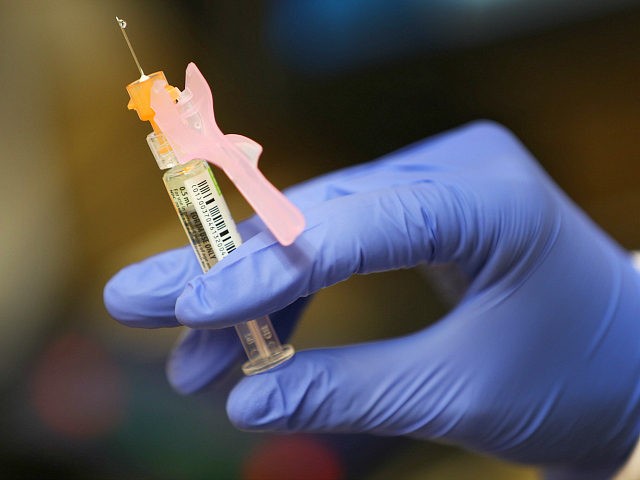State media in Cuba revealed that Cubans on the island are currently participating in Phase II clinical trials of a mystery Chinese coronavirus vaccine candidate in development with the Iranian Islamic regime, the Spanish newspaper Diario de Cuba reported Tuesday.
The alleged coronavirus vaccine candidate is the product of the Pasteur Institute of Iran and an unnamed Cuban company, according to Kianoush Jahanpour, a spokesman for Iran’s Food and Drug Administration (IFDA). The human trials, according to Iranian state media, are currently underway in Havana.
The news, revealed in Iranian state media in the new year, follows claims by Iran’s Islamic Revolutionary Guard Corps (IRGC), a U.S.-designated terrorist organization, that it was developing a vaccine against the Chinese coronavirus, despite not having any history of pharmaceutical research. The Communist Party of Cuba, on its end, announced over the summer the development of two vaccine candidates, known as Soberana (“sovereign”) 01 and 02. Neither Cuban vaccine candidate has passed Phase III clinical trials, and the IRGC stopped mentioning its alleged vaccine after March 2020.
According to the World Health Organization (W.H.O.), pharmaceutical institutes around the world are developing over 50 different registered vaccine candidates against the Chinese coronavirus, currently responsible for an ongoing pandemic that began in Wuhan, China, in November 2019. The official W.H.O. draft landscape of coronavirus vaccine candidates, which lists all vaccine candidates currently in development, lists only one vaccine candidate — allegedly in “pre-clinical development” — by the Iranian government, which does not mention any cooperation with Cuba. The two soberana vaccine candidates do appear on the list. The Iranian Pasteur Institute does not, though Iran and Cuba made the joint announcement after the last update of the list on December 29.
Jahanpour, the Iranian spokesman, claimed that the Phase I clinical trials of the mystery vaccine candidate concluded successfully, but did not provide details regarding when these trials occurred or the details of the alleged success. The trials presumably used Cuban subjects, not Iranians.
The Phase III clinical trials will reportedly take place in Tehran.
“The second phase of the human trial is being conducted under the supervision of the Pasteur Institute of Iran in Cuba. Provided that the second phase is successful, the third phase will be implemented in Iran,” Jahanpour said, according to Iran’s Mehr news agency.
The Iranian government announcement noted pointedly that Tehran is also seeking to participate in COVAX, a program by the W.H.O. to help distribute coronavirus vaccines to underprivileged nations, and that it is also actively trying to purchase vaccine candidates from companies developing them abroad, calling into question the trust that the Iranian regime is putting into its own research.
Iranian President Hassan Rouhani had already announced attempts to purchase foreign coronavirus vaccine candidates in August.
“The vaccines should be procured soon and undergo all the tests and trials inside Iran as the country is facing the second wave of the COVID-19 [Chinese coronavirus] crisis,” Rouhani said at the time. “Rouhani further urged people to observe all health protocols and help the country’s health authorities and personnel effectively fight the viral infection.”
Last month, Rouhani complained that U.S. sanctions on the Iranian regime over its gross human rights abuses and its illegal nuclear weapons program were preventing the nation from accessing the vaccine candidates currently available around the world.
“These people that were at the helm in the White House, and are spending the final days of their miserable [political] lives, were so evil that they did not even show mercy towards the health of people,” Rouhani reportedly complained, “the elderly and the disabled amid the coronavirus issue, and they acted in the most corrupt and most savage manner towards the people of the region and the great nation of Iran.”
As a designated state sponsor of terrorism, American companies are prohibited from doing business with Iran. Sanctions imposed by President Donald Trump in 2018 also barred America from doing business with foreign companies that do business with Iran.
Rouhani did not mention the possibility of using Iranian-made vaccine candidates instead of those Tehran allegedly cannot purchase due to the United States.
The Iranian government also claimed in November to have developed a novel way to test individuals for Chinese coronavirus, a “homegrown” antigen test that officials claimed takes only 20 minutes to confirm a case. Iranian officials made the announcement with loud articles proclaiming Tehran’s scientific might in state media, but have since not updated on the manufacturing or mass use of the testing. In April, the head of the IRGC terrorist group, Major General Hossein Salami, similarly claimed the jihadists had developed a “magnetic” device that tests for coronavirus. International observers noted that the item Salami wielded during the announcement appeared similar to a fake “bomb detector” sold in Iraq.
Like the Iranian government, the Cuban Communist Party has claimed to spearhead various innovations in fighting the Chinese coronavirus pandemic. Cuban regime officials have been claiming since April that interferons, proteins sometimes involved in identifying infections, can be used to fight coronavirus. That month, doctors working with the NGO Cuban Prisoners Defenders warned that no scientific evidence exists that interferons can help fight coronavirus infections and using them may “kill, rather than cure, patients.”
Cuban state propaganda outlet Granma has largely shied away from the alleged interferon “cure” in the wake of the Soberana vaccine candidate development. Last week, dictator Raúl Castro’s second-in-command, Miguel Díaz-Canel, visited the Finlay Institute of Vaccines in Havana to oversee the alleged development of the vaccine candidates, where he praised the scientists for “functioning like a family, uniting, struggling, resisting in the midst of adversity in the culminating year, and triumphing.”

COMMENTS
Please let us know if you're having issues with commenting.